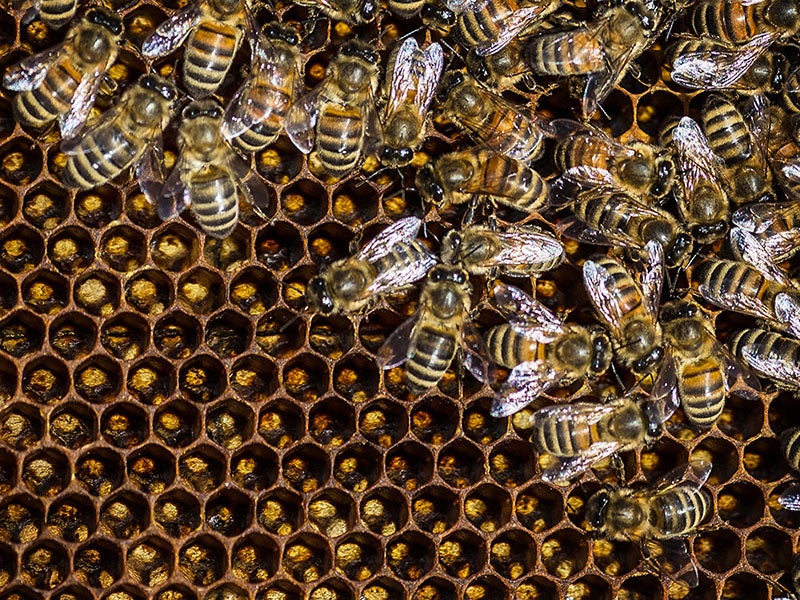Protect Honeybees, Nature's Migrant Workers
Why we are working to get bee-killing pesticides out of California fields.

This page was published 11 years ago. Find the latest on Earthjustice’s work.
Why do we care about honeybees? Just browse the produce section of your local Trader Joe’s or the football-field-long Berkeley Bowl, the popular Bay Area grocery store, to get a quick answer. It’s estimated that one in every three bites of food we eat depends on honeybees for pollination, and they happen to be the healthiest bites, too. Without honeybees, the apples, avocados, almonds, blueberries, strawberries, melons and many other nutritious, California-grown fruits, nuts and vegetables we eat every day wouldn’t exist.
Today, these complex and normally resilient creatures, which have inhabited the Earth for 40 million years, have been dying at an unprecedented rate. In what is called colony collapse disorder, one-third of honeybee hives have failed each year over the past decade. The message from honeybees is clear: Our current agricultural practices demand reform.
Honeybees are a fascinating species. They practice associative learning and preventative health care in their colonies. They smell pheromones and see ultraviolet colors. Their hives are super-organisms with highly specialized divisions of labor. And they are nature’s ultimate migrant worker, shipped by the millions in tractor trailers across the country to pollinate crops and orchards. Across the United States, pollination contributes $20 billion to $30 billion in agricultural production annually.
The reasons behind colony collapse disorder are complicated, but scientists have identified chronic exposure to pesticides as a leading contributing factor. In particular, a long-lasting and highly toxic class of pesticides called neonicotinoids, or neonics, has been identified as exacerbating—if not triggering—the honeybee crisis. Neonics are systemic pesticides meaning they are absorbed into the plant and expressed through its leaves, pollen and nectar. Honeybees and other insects are exposed when they gather nectar or pollen from a pesticide-laden plant. Exposure results in an effective cancer for the honeybees: Their immune systems are weakened, leaving them susceptible to attack by harmful viruses. Other impacts include disruption to mobility, navigation, feeding, foraging, memory and learning.
The impact of neonics on honeybees is not news to the California Department of Pesticide Regulations, the state agency responsible for regulating pesticides in the state. In 2009, the Department of Pesticide Regulations placed neonics into a re-evaluation process to determine whether their use should be curtailed, given mounting evidence of their devastating impacts on bees. More than five years later, however, the re-evaluation is still pending and the agency has taken no significant steps to protect honeybees.
Worse still, the Department of Pesticide Regulations has rubber-stamped numerous approvals of new and expanded uses of neonics without analysis of their impacts to honeybees. Just last month, the agency approved the expanded use of two powerful neonics—sold under the trademarks Venom Insecticide and Dinotefuran 20SG—despite its unfinished review of impacts to pollinators. This rubber-stamping of pesticides has allowed multinational chemical companies to transform California’s crops, our nation’s salad bowl, into a toxic jungle.
The Department of Pesticide Regulations has an obligation to ensure that the toxic chemicals it approves for agricultural use do not harm agriculture or human health. Because the honeybee crisis is at a tipping point, Earthjustice and its clients Pesticide Action Network, Center for Food Safety, and Beyond Pesticides have brought a legal action to halt the Department of Pesticide Regulations from approving pesticides that kill bees.
Solutions to the pesticide problem exist, ranging from reduced, more strategic management of chemical use, to the planting of biodiverse crops in lieu of agricultural monoculture, and the planting of wildflowers and cover crops to decrease farmers’ reliance on fertilizers and pesticides.
This op-ed first appeared in the San Francisco Examiner.
The California Regional Office fights for the rights of all to a healthy environment regardless of where in the state they live; we fight to protect the magnificent natural spaces and wildlife found in California; and we fight to transition California to a zero-emissions future where cars, trucks, buildings, and power plants run on clean energy, not fossil fuels.